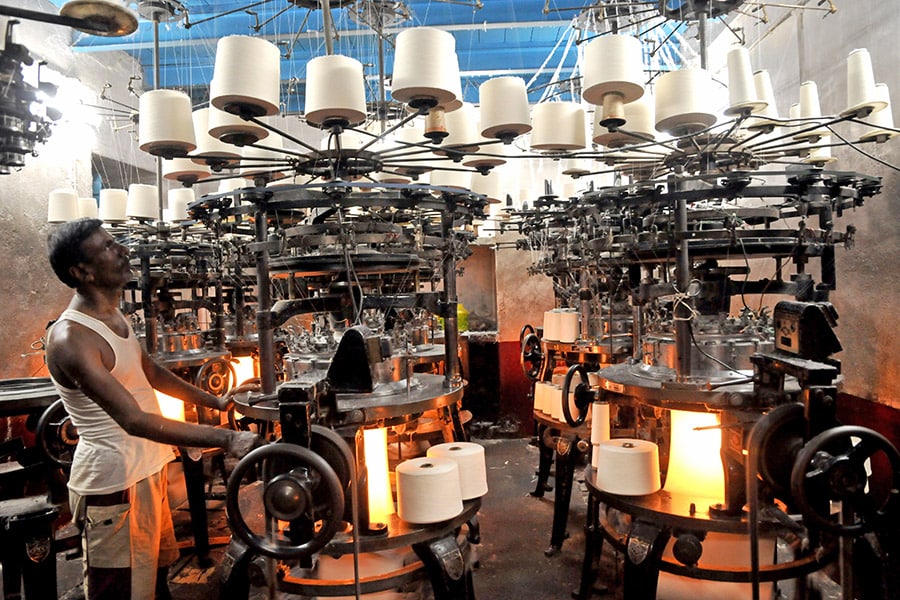Budget 2024: FM boost for MSMEs
Sitharaman rolls out credit guarantee scheme, increases Mudra loan limit from Rs 10 lakh to Rs 20 lakh
 The Mudra loan limit is increased from Rs 10 lakh to Rs 20 lakh for those who have previously availed and repaid the loan. Image: Debajyoti Chakraborty/NurPhoto via Getty Images
The Mudra loan limit is increased from Rs 10 lakh to Rs 20 lakh for those who have previously availed and repaid the loan. Image: Debajyoti Chakraborty/NurPhoto via Getty Images
In the credit guarantee scheme, MSMEs can get term loans for investments in machinery without any collateral or third-party guarantee. The finance minister said the scheme will operate on the pooling of credit risks of such MSMEs. A separately constituted self-financing guarantee fund will provide each applicant with a guarantee covering up to Rs 100 crore, while the loan amount may be larger.
Additionally, the finance minister announced stress period credit support for MSMEs. This provision will allow MSMEs to get continued credit from the bank during the stress period. A government-promoted guarantee fund supports credit availability for MSMEs. Further, the Mudra loan limit is increased from Rs 10 lakh to Rs 20 lakh for those who have previously availed and repaid the loan.
"The announcement of the credit guarantee scheme for loans up to Rs 100 crore for MSMEs can provide a much-needed boost for the manufacturers. We will need to wait for further details and clarifications to understand its scope and applicability, but it has the potential to unlock a flurry of investment into machinery and capital equipment,” says Mayank Dalmia, co-founder of Wave Mechanics.
Another major announcement for MSMEs is the in-house credit assessment by the public banks. Based on the digital footprints of an MSME, public banks can now develop their assessment for lending instead of relying on external assessment, which was primarily based on assets and turnover criteria. The move is likely to help smaller MSMEs that do not have a formal accounting system.Also read: Budget 2024: Internships for 1 crore youth at India's top companies
The budget also announced the further expansion of SIDBI branches in the MSME clusters for ease of lending in the next three years. The government is planning the expansion of SIDBI branches to major clusters. Currently, India has 242 major MSME clusters, and the government plans to open a SIDBI branch in 168 such clusters in the next three years.
The finance minister also stressed the need for further development of the food processing industry. She said the government would financially support 50 multi-food irradiation units. Further, the government would set up 100 food safety and quality testing labs to resolve the testing requirements of the food processing industry in a timely manner.
Tamal Sarkar, senior advisor at the Foundation for MSME Cluster, says an estimated 20 percent of India’s 1,300 industrial clusters are in food processing, and the decision to invest in food irradiation units and food quality and safety labs will be crucial. “These may be specially done in Northeast India, where the scope for industrialisation is mostly limited to artisanal and processed food clusters,” he adds.Also read: Budget 2024: Govt to facilitate development of industrial parks, dormitories near manufacturing
The budget also announced a reduction of the mandatory turnover threshold for onboarding the TReDS (Trade Receivable Electronic Discount System) platform. The mandatory onboarding threshold is lowered from Rs 500 crore to Rs 250 crore. CA Aditya Sesh, managing director of Basiz Fund Service Pvt Ltd, says this will help address the working capital challenges faced by the MSME sector.
“Previously, only very large companies could access this platform due to credit risk concerns. However, with improved credit monitoring, better GST data, and more accurate credit scoring, the criteria have been relaxed. This allows many more companies to use the platform, enabling their vendors to discount invoices and reduce working capital needs.” Sesh says.


















